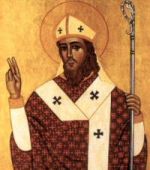Fathers of the Church
Letter CLXXVII. Letter to Andreas, Bishop of Samosata
Description
Theodoret’s letters are a mine of information for the history of the fifth century, of the author’s life and of the history of dogma in general. This large correspondence is distinguished for its unpretentious learning, felicitous diction and perfect grace of style. (Quasten) Here Theodoret states that Cyril of Alexandria, although he has not accepted a statement of faith drawn up by the Antiochene bishops (probably by Theodoret himself), has expressly rejected the heresies that Theodoret and others of the school of Antioch had accused him of reviving. However, he also continues to insist on the condemnation of Nestorius. To this demand Theodoret replies that Nestorius cannot be condemned, but that the heresies attributed to him can be anathematized. (Theodoret never, or else not until much later, admitted that Nestorius actually taught the heresy associated with him. He was finally induced to condemn him at the Council of Chalcedon in 451.)
Provenance
Theodoret of Cyrus (c. 393-466), the wise and zealous bishop of Cyrus, a small town near Antioch, was the last great theologian of the school of Antioch. Although he first considered Alexandrian Christology dangerous, and refused to condemn Nestorius until the Council of Chalcedon, his commitment to the correct doctrine of the Incarnation should not be questioned. As late as the 14th century more than 500 of his letters were extant, of which we still have 232. This letter was during the reconciliation of the Antiochene and Alexandrian parties in 433, two years after the Council of Ephesus. The assertion that Cyril “did withhold his consent from our statement” suggests that this letter is earlier than letters CLXXI-CLXXVI.
by Theodoret in c. 433 | translated by Blomfield Jackson
The illustrious Aristolaus has sent Magisterianus from Egypt with a letter of Cyril in which he anathematizes Arius, Eunomius, Apollinarius and all who assert Christ's Godhead to be passible and maintain the confusion and commixture of the two natures. Hereat we rejoice, although he did withhold his consent from our statement. He requires further subscription to the condemnation which has been passed, and that the doctrine of the holy bishop Nestorius be anathematized. Your holiness well knows that if any one anathematizes, without distinction, the doctrine of that most holy and venerable bishop, it is just the same as though he seemed to anathematize true religion.
We must then if we are compelled anathematize those who call Christ mere man, or who divide our one Lord Jesus Christ into two sons and deny His divinity, etc.
Taken from "The Early Church Fathers and Other Works" originally published by Wm. B. Eerdmans Pub. Co. in English in Edinburgh, Scotland, beginning in 1867. (NPNF II/III, Schaff and Wace). The digital version is by The Electronic Bible Society, P.O. Box 701356, Dallas, TX 75370, 214-407-WORD.
To Fathers of the Church home page






